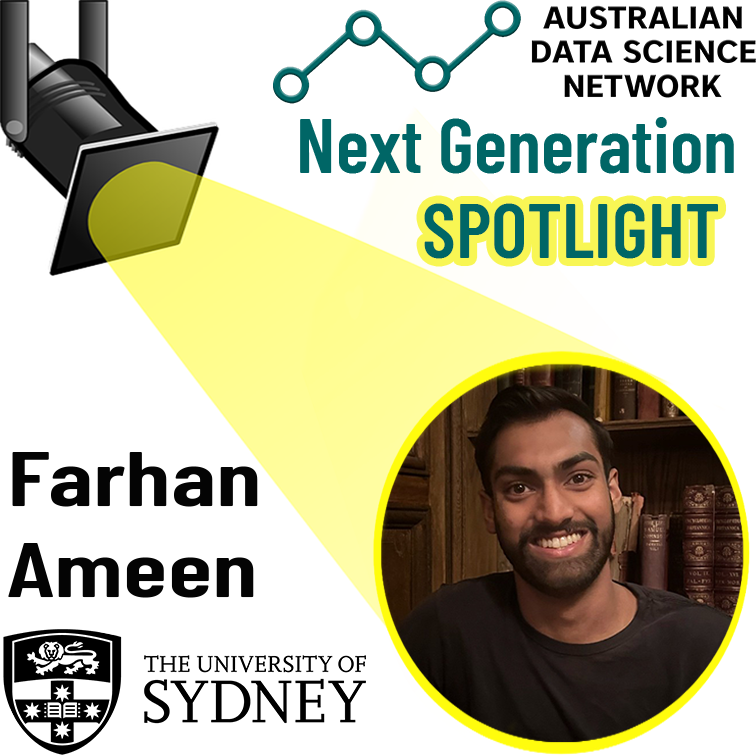“Next Gen” Spotlight: Farhan Ameen
Tell us a bit about yourself
My name is Farhan, I’m a second year PhD student at the Sydney Precision Data Science Centre at the University of Sydney. I am passionate about leveraging data science approaches to learn about the most pressing diseases affecting society today. Outside of my PhD you will find me camping, taking photos, going to concerts and cooking!
What is your PhD in and how did you choose this project?
My PhD is centred around developing statistical methodology for the spatial analysis of spatial omics data. This is data which essentially comes out of a very fancy microscope. This type of data not only allows us to quantify how cells are spatially arranged in tissue, but also measure the genetic or proteomic profiles of each cell. The aim of my PhD is to understand and characterise the spatial organisation of cells and infer cell to cell interactions. These insights can enhance and complement our understanding of disease and improve the prediction of patient disease and treatment response.
I chose this project because spatial omics technologies represent a relatively new and rapidly evolving area within our field. I often describe it as the "wild west" of bioinformatics, with constantly changing technologies and few established guidelines for data analysis. Being at the forefront of such an emerging technology is incredibly exciting, and I’ve had to really stretch my creativity and problem-solving abilities. All these aspects have drawn me to this project.
Any surprises or highlights from your PhD journey?
I’ve been very fortunate during my PhD to take part in opportunities beyond my core research area. One highlight was attending a two-week PhD course hosted by EMBL Australia, where I was explored to a wide array of innovative ideas in biological research. Additionally, I have been involved in teaching the capstone data science unit at the University of Sydney, leading a marine science project. In this role, I supervise students who use data science techniques to investigate factors affecting coral reef health.
Another exciting experience was participating in the 2023 UN Datathon, where my team, the "Down Under Data Wizards," developed an app to predict optimal locations for solar farms worldwide. To our surprise we placed 2nd globally in the competition. These experiences have been incredibly rewarding, challenge my initial notion that a PhD limits you to one niche. I have been pleasantly surprised by the transferability and versatility of data science.
How did you get interested in Data Science?
I was introduced to data science through a compulsory unit in my undergrad. This course introduced me to a variety of data stories, showcasing the amazing applications of data science in multiple fields, including ones I was personally passionate about. I found myself drawn to the blend of quantitative statistical thinking and creative problem solving inherit to data science. I was also drawn to the flexibility that data science offers. Whether its exploring diverse research topics, engaging in cross-disciplinary collaborations, the opportunity to travel or the convenience to work from anywhere, I believe data science offers something for everyone.
What do you see as the big challenge facing the ADSN and the entire Data Science Community? Is there a big research question we should be tackling?
The rapid adoption of AI tools has been transformative. AI holds the potential to solve some of the most pressing issues we face today. While the increased accessibility of AI has empowered non-experts to harness the power of this technology. However, the naive use of these technologies can lead to unintended consequences. Behind every AI model there are a series of human decisions which shape how each model functions and behave. These decisions introduce implicit biases in every part of the AI pipeline from data collection, training and deployment. As data scientists we are in a unique position to both develop and critically evaluate AI tools. As a community, investing in the development of tools which evaluate AI fairness and elucidate the mechanisms of these models will ensure a future of safe and fair AI use.
Fun fact about yourself...
Based on my biased sample, I am the only beatboxing bioinformatician I know.
